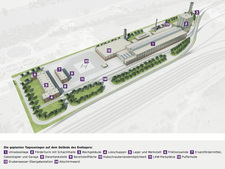Who is responsible for alterations at Konrad requiring planning permission?
There is a lot of above-ground work to be done at Konrad 1 and Konrad 2. The question who gives the planning permission for alterations, whether this is to be the federal state of Lower Saxony or the city of Salzgitter, had not been clarified for a long time among the federal state and the city.
The construction of the Konrad repository requires building measures that are no significant alterations of the repository project and do thus not require a plan-approval procedure pursuant to Atomic Energy Act. Nevertheless, also insignificant alterations of the building project may require planning permission. Now the question arises as to which institution is responsible.
Accelerated procedure pursuant to § 82 Lower Saxon building regulations?

![]() Surface facilities at Konrad Shaft 2
Surface facilities at Konrad Shaft 2
To minimise administrative cost, the Federal Office for Radiation Protection (BfS) aims at an accelerated assent procedure pursuant to § 82 para. 1 Lower Saxon Building Regulation (NBauO). This regulation says: When the federation is the building owner and has the draft work done and the building work supervised by its employees who have the ability for higher technical administration in the field of structural engineering or civil engineering, the usually required planning permission is replaced by the assent of the highest building control authority, the Lower Saxon Ministry for Social Affairs, Women, Family, Health and Integration (NMS).
Different opinions
The NMS argued: The Federal Office for Radiation Protection was not a building administration but was representing the federation as the building owner as end consumer and was thus no instance doing the construction work. Besides the BfS did not cover the range of services of the public project management Lower Saxony. Apart from specialist staff, these services included also an own technical administrative structure which could simultaneously take care of several extensive building measures. The NMS then rejected the BfS application for an accelerated assent procedure at the end of October 2010.
After the NMS had rejected the accelerated assent procedure pursuant to § 82 NBauO the BfS addressed its building application directly to the local authority, the city of Salzgitter. However, the city of Salzgitter did not consider to be responsible but referred to the NMS being competent. The local authority also justified this with § 82 NBauO. In addition to other institutions and private persons, the local authority had previously filed a suit against the licensing of the repository, without success.
NMS instructs city to examine building applications
In terms of competence for the alterations requiring planning permission the NMS has meanwhile instructed the city of Salzgitter as the competent building permit authority to process those building applications filed by the BfS that do not deal with significant alterations pursuant to § 9b Atomic Energy Act, and to take the respective decisions on its own authority. Preliminary talks among the city of Salzgitter and the BfS already took place, dealing with the future procedure. When the granting of the licence can be expected is still open.
Consequences
The question as to which authority is competent for giving assent to building alterations is key, since the work to be done cannot be started with as long as they have not been licensed. The fact that competence has been unclear and delays in the examination of building applications are linked with a delay in taking the repository into operation and with more costs to arise for the project.
As early as in 2008 the BfS wished to initiate first talks as to the procedure for building applications. The NMS gave order to process the building applications to the city of Salzgitter in December 2010.
State of 2011.03.09

